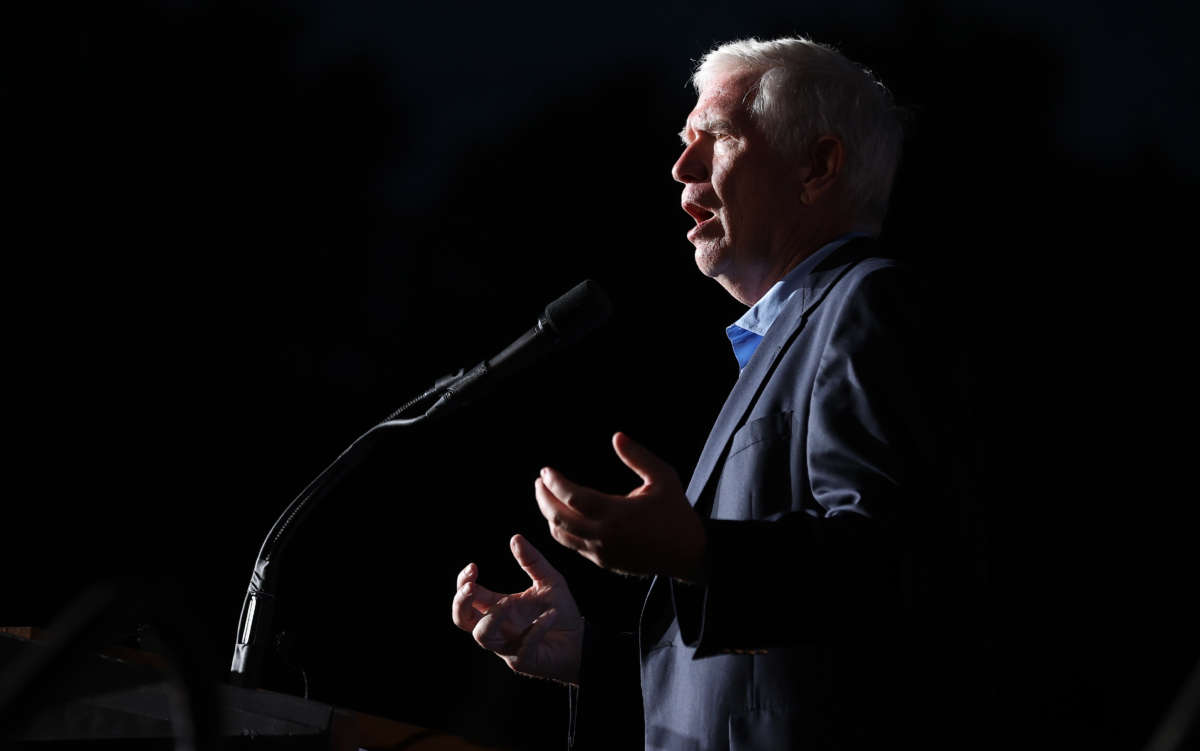Support justice-driven, accurate and transparent news — make a quick donation to Truthout today!
Rep. Mo Brooks, a far right Republican from Alabama, has denied claims from organizers of the attack on the Capitol on January 6 that he was involved in planning the attack. Instead, Brooks has shifted blame onto his staff — while saying that he would be “proud” if his staff were involved.
The Alabama Republican was named by January 6 organizers as one of a group of extremist right-wing representatives who met with planners of the attack, according to a bombshell report by Rolling Stone that was released over the weekend. The Alabama lawmaker’s name has also come up in previous discussions over lawmakers’ roles in the attack for inciting attackers that day. In a contentious speech, he said, “Today is the day that American patriots start taking down names and kicking ass,” just before attackers marched to the Capitol partly at his urging.
While denying his own personal connection to the attack, Brooks suggested to AL.com that his staff may have been involved. “Quite frankly, I’d be proud of them if they did help organize a First Amendment rally to protest voter fraud and election theft,” he said, despite the fact that, nearly a year after the 2020 election, no evidence of widespread voter fraud has been found.
Brooks has previously denied wrongdoing for speech on that day, saying he won’t apologize for his words. After the attack, Brooks was named by Rep. Pramila Jayapal (D-Washington) as someone who had a role in “instigating and aiding” the attack. He’s also been served a lawsuit over his speech by Rep. Eric Swalwell (D-California), which Brooks attempted to dodge by asking the Department of Justice if they would shield him from it.
Regardless of whether Brooks is lying about his involvement — despite his lies about whether or not it was actually far right militants who carried out the attack — he has made questionable choices that suggest he may have known more about the attempted coup beforehand than he’s letting on.
Brooks wore body armor during the January 6 rally, saying that he was warned on Monday that the attack might get violent. He took such drastic steps to protect himself that he didn’t even go home before the event, but rather slept on the floor of his office. In spite of that supposed fear, however, Brooks now says that he didn’t intend to go to the rally before the attack until that Tuesday. And then, of course, he still went and made a speech that riled up the crowd to be hungry for violence.
In contrast, Rep. Alexandria Ocasio-Cortez (D-New York), a likely target of the violent right-wing crowd, also took steps to protect herself before the incident, but none quite as drastic as sleeping in her office. Rather, Ocasio-Cortez said that she took off her pin identifying her as a member of Congress and avoided going outside by Tuesday — mostly because of hostile people she had noticed in public.
By casting aside blame, Brooks may be trying to protect himself from potential consequences if his alleged ties to January 6 planners are made explicit. Prosecutors have said that lawmakers found to have conspired with the militants could face criminal liability and would not be shielded by their roles in the government. Members named by the January 6 planners in the Rolling Stone report, like Representatives Marjorie Taylor Greene (R-Georgia), Madison Cawthorn (R-North Carolina) Lauren Boebert (R-Colorado) and Paul Gosar (R-Alabama), are also facing calls to be expelled from their roles in Congress as a bare-minimum punishment.
Consequences for officials for defying orders related to January 6 were revealed last week, when the House committee investigating January 6 voted unanimously to hold former Trump advisor Steve Bannon in contempt of Congress, recommending criminal charges to the Department of Justice.
Not all Trump allies have defied the committee. At least five former Trump staffers have voluntarily spoken with the committee, according to CNN. However, it’s unclear what is motivating the staffers to comply, and they may well have been scared into compliance after seeing what happened to Bannon or the subpoena threats that their colleagues have received.
Though it’s yet unclear whether the committee will call members of Congress for their alleged roles in planning the attack, the committee has subpoenaed organizers. It has also sought to gather information such as phone records on lawmakers involved with the attack, but the committee has not said who they’re probing. Still, perhaps fearing what would emerge, Brooks, Gosar, Boebert and Greene sent a letter to telecommunications companies trying to sabotage the information-gathering process.
A terrifying moment. We appeal for your support.
In the last weeks, we have witnessed an authoritarian assault on communities in Minnesota and across the nation.
The need for truthful, grassroots reporting is urgent at this cataclysmic historical moment. Yet, Trump-aligned billionaires and other allies have taken over many legacy media outlets — the culmination of a decades-long campaign to place control of the narrative into the hands of the political right.
We refuse to let Trump’s blatant propaganda machine go unchecked. Untethered to corporate ownership or advertisers, Truthout remains fearless in our reporting and our determination to use journalism as a tool for justice.
But we need your help just to fund our basic expenses. Over 80 percent of Truthout’s funding comes from small individual donations from our community of readers, and over a third of our total budget is supported by recurring monthly donors.
Truthout has launched a fundraiser to add 379 new monthly donors in the next 6 days. Whether you can make a small monthly donation or a larger one-time gift, Truthout only works with your support.
